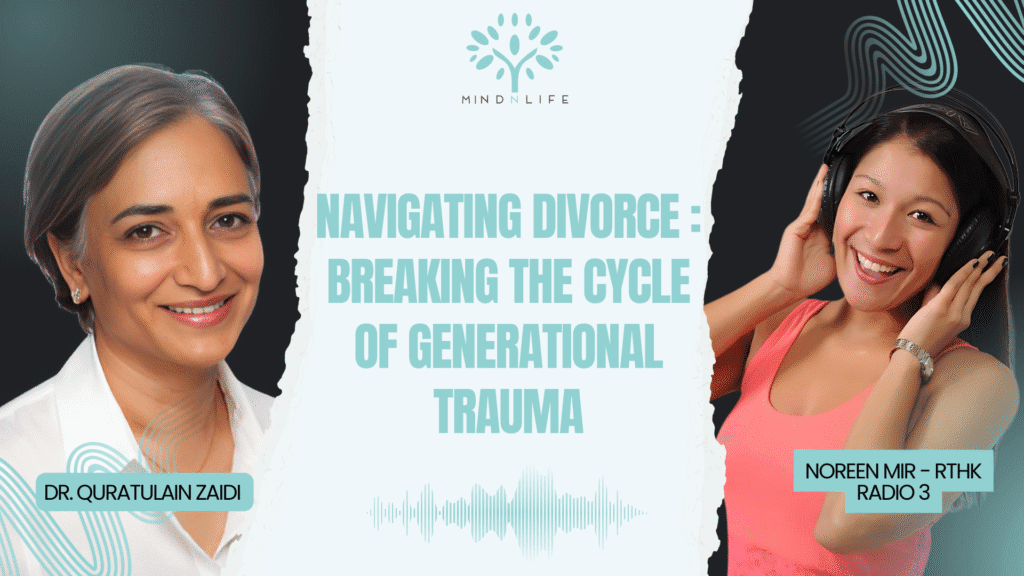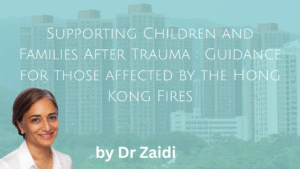Divorce is never easy, but the way we handle it can shape not just our own healing, but the emotional well-being of generations to come. In a recent conversation on RTHK Radio 3’s Brunch programme, clinical psychologist Dr Quratulain Zaidi explored the profound impact divorce can have on families—and more importantly, how parents can break cycles of generational trauma whilst protecting their children’s future relationships.
The Emotional Reality Behind Financial Decisions
Money isn’t just numbers on a page during divorce proceedings. As Dr Zaidi explains, “Finances mean so many different things to us, right, from our lived experience of it through our childhood and what it meant. So finances can mean a sense of security. Finances can mean so many different things.”
The challenge lies in separating the practical from the deeply personal. When couples are grappling with hurt, betrayal, and shattered dreams, financial decisions often become weapons rather than solutions. “Decisions that are made in the heat of anger to hurt the other party or get back at somebody… usually is not in the best interest of yourself or your children,” Dr Zaidi notes.
The antidote? A clear plan with the right professionals. Mediation and collaborative practice offer alternatives to adversarial court proceedings, helping couples focus on fairness rather than “winning.” This approach isn’t just about preserving assets—it’s about preserving dignity and setting a foundation for healthier co-parenting relationships.
What Is Generational Trauma in Divorce?
Generational trauma might sound like psychological jargon, but it’s remarkably straightforward: emotional wounds that aren’t fully resolved in one generation get unconsciously passed down to the next. In the context of divorce, children often inherit patterns of mistrust, fear of abandonment, or conflict avoidance from witnessing their parents’ separation.
Research consistently shows that children exposed to high-conflict divorces are more likely to develop anxious or avoidant attachment styles that persist into adulthood. However, as Dr Zaidi emphasises, “It’s not because divorce itself is inherited… it is because those early experiences and the lived experience of that separation and divorce and the expectations about love and security, that is what creates that space.”
The encouraging news? These patterns can absolutely be interrupted with awareness and intentional parenting.
How Children Really Experience Divorce
One of the most heartbreaking aspects of Dr Zaidi’s work is hearing directly from children caught in the middle of parental conflict. She shares the example of a young child who said, “I have to be a good girl… I have to make sure that mummy isn’t crying all the time and isn’t sad all the time.”
Children are “emotional sponges,” picking up on tensions and conflicts even when parents think they’re shielding them. A particularly poignant example involved a three-and-a-half-year-old who had begun shutting down emotionally, hiding his tears and saying what he thought adults wanted to hear, despite not even being told about his parents’ impending separation.
“Do not underestimate their emotional intelligence,” Dr Zaidi warns. “They pick up on everything around themselves.”
The key to supporting children through this difficult transition? Consistency, reassurance, and permission to love both parents. When children feel secure in their relationships with both parents and understand that the divorce isn’t their fault, they demonstrate remarkable resilience.
The Long Shadow: How Parental Divorce Shapes Adult Relationships
The impact of witnessing parental conflict doesn’t end when children reach adulthood. Many adult children of divorce find themselves in one of two camps: either avoiding commitment entirely due to fear that relationships inevitably end in hurt, or clinging too tightly to relationships, ignoring red flags to avoid being alone.
Dr Zaidi explains: “People either… don’t want to commit to anything, or it is a tendency to cling tightly to the relationship because they believe that relationships are inherently unstable. So people then tend to overcompensate by being, ‘I’ll be whatever you want me to be. Please just stay in the relationship.'”
This pattern can create a cycle where the children of divorced parents struggle with their own relationships, potentially passing these insecurities on to the next generation.
Breaking the Cycle: When Trauma Affects Parenting
Perhaps most concerning is when adults who experienced their parents’ divorce struggle with their own parenting. Dr Zaidi describes working with parents who, having been peacemakers in their childhood homes, now find themselves unable to set boundaries with their own children.
“I know someone… they’ve become parents, and they never say no to their children because they are so scared of their children not loving them,” she shares. This fear of abandonment—rooted in childhood experiences—can actually harm the parent-child relationship, as children benefit from structure and boundaries.
The solution involves recognising which reactions belong to the “younger self” and doing the work to separate past experiences from present parenting decisions. As Dr Zaidi puts it, “Your past shapes you, but it doesn’t define your future.”
Practical Steps for Healthier Outcomes
So what can divorcing parents do to minimise trauma and break generational cycles?
Focus on the children’s perspective: Remember that you’ll always be co-parents. Your child shouldn’t have to choose sides or reject one parent to please the other.
Separate emotion from practicality: Whilst the hurt is real and valid, try to approach legal and financial decisions with clarity rather than anger.
Consider alternatives to court: Mediation and collaborative practice often lead to better outcomes for everyone involved, particularly children.
Model healthy conflict resolution: Show your children that disagreements can be handled respectfully and that love doesn’t disappear when people make mistakes.
Do your own emotional work: Whether through therapy, support groups, or self-reflection, addressing your own trauma prevents it from affecting your parenting.
The Technology Solution
Interestingly, even technology is stepping in to help. There are now apps designed specifically for co-parent communication that can help translate potentially inflammatory messages into more neutral, constructive language—turning “you’re wasting my time” into “I’m feeling overwhelmed right now, let’s sort this out smoothly.”
A Message of Hope
Perhaps the most important message from Dr Zaidi’s insights is one of hope: “It’s never too late to change the story, and every healthy interaction you have with your child helps rewrite their future.”
Breaking cycles of generational trauma isn’t about perfection—it’s about awareness, intention, and the willingness to do better. When parents prioritise their children’s emotional well-being over their own hurt and anger, they create the possibility for healthier relationships across generations.
Divorce may mark the end of a marriage, but it doesn’t have to mark the beginning of lifelong trauma for children. With the right approach, support, and commitment to healing, families can navigate this challenging transition whilst actually strengthening their capacity for love, trust, and resilience.
To hear the full conversation between Noreen Mayer and Dr Quratulain Zaidi, including more detailed strategies for supporting children through divorce, watch the complete interview below. Follow us on our Youtube channel.




